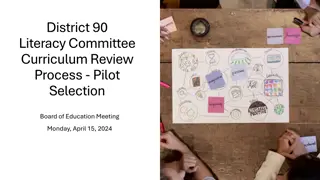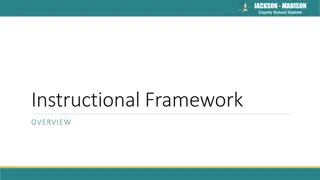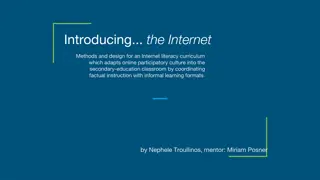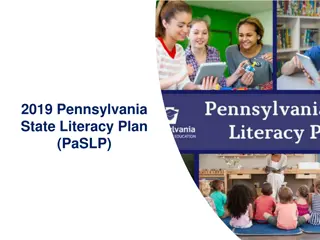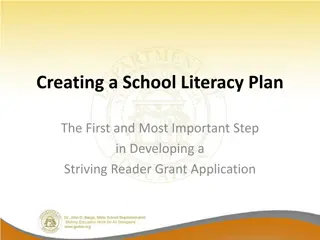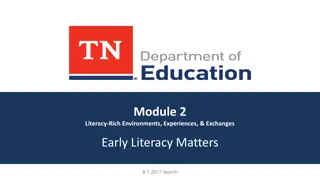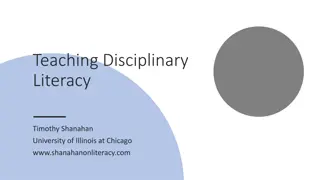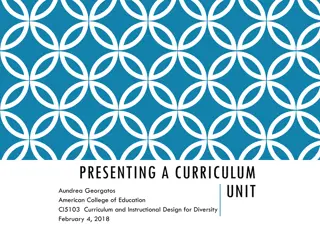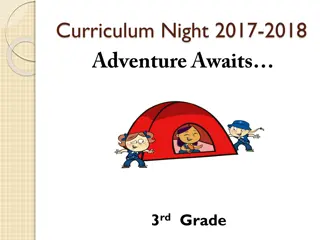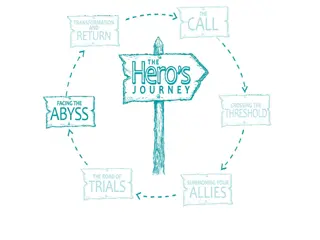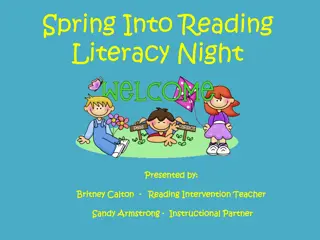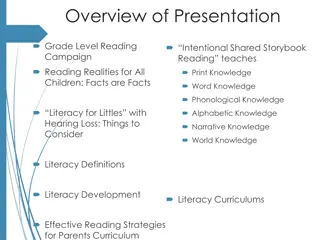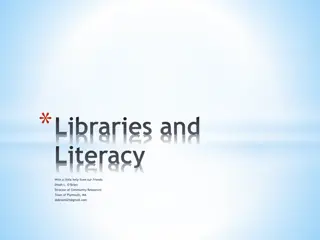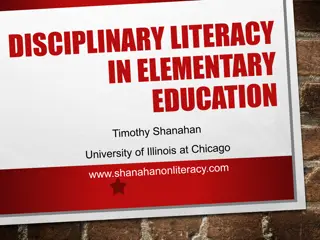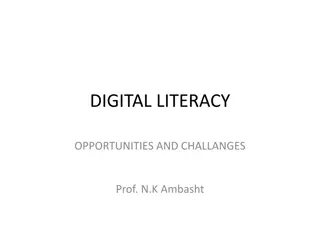Balanced Literacy Curriculum for 1st Grade: Guidelines and Expectations
Explore the balanced literacy curriculum for 1st grade, focusing on guided reading, behavior expectations, and daily conduct. Learn about the consequences of behavior changes, the GRA reading assessment, and the teachers involved. Stay informed to support your child's learning journey effectively.
Download Presentation

Please find below an Image/Link to download the presentation.
The content on the website is provided AS IS for your information and personal use only. It may not be sold, licensed, or shared on other websites without obtaining consent from the author. Download presentation by click this link. If you encounter any issues during the download, it is possible that the publisher has removed the file from their server.
E N D
Presentation Transcript
Curriculum Night 2020-21 1st Grade
FRIENDS 4th Grade
Welcome to Curriculum Night 1st Grade Teachers Jeanette Baines Isabella Gonzales Claudia Larkin Lindsey Dante-Smith Whitney Garner Sasha Walker jeanette.baines@lcisd.org isabella.Gonzales@lcisd.org claudia.larkin@lcisd.org lindsey.dantesmith@lcisd.org whitney.garner@lcisd.org sasha.walker@lcisd.org
Nine Week Behavior Expectations Infraction chart by grade level: Grade Level Expectations Kindergarten S = 0-8 color changes/infractions N = 9+ color changes/infractions All other grades 1st-5th S = 0-8 color changes/infractions N = 9-12 color changes/infractions U = 13+ color changes/infractions Conduct grades will include infractions received for no homework. Office referrals will be counted as 9 infractions. Therefore, a student will receive no better than an N in conduct in nine weeks where behavior has resulted in an office referral.
Daily Folder Conduct Chart Teachers will mark daily conduct in the Daily Folder. Please check this each night, sign and return. Students that are on green for the day will have a green dot, a sticker, or an empty box. Other color changes will be noted in the folder. The behavior charts are stapled in each Daily Folder.
Consequences GREEN Excellent Behavior positive reinforcement YELLOW a reminder to check behavior .will walk 2 laps during recess BLUE will want to make behavior changes ..will walk 5 laps during recess RED automatic office referral .will walk the track during all of recess Students that receive a color change after recess will walk the track the following day.
Guided Reading As part of our Balanced Literacy curriculum, teachers will differentiate reading instruction through Guided Reading. Teachers will use assessment data to plan and adjust small group Guided Reading lessons. Groups will be flexible and will focus on specific strategies and skills needed by students. Students will rotate between literacy-based activities, independent reading, and meeting with the teacher as part of our Reader s Workshop approach.
1st Grade GRA Reading Assessment Teachers will administer the GRA reading assessment for the 1st, 2nd and 4th nine weeks. Reading levels will be recorded on the report card. Minimum Reading Levels for First Grade 1st Nine Weeks 2nd Nine Weeks 3rd Nine Weeks 4th Nine Weeks 10 (F) 14 (H) 16 (I) 8 (E) Running Record
Raz-Kids https://www.raz- kids.com/main/VideoLibrary/id/670 Soon all Frost students will have access to Raz Kids at school and at home. Keep an eye out for log-in information in your child s Tuesday folder.
Home Readers Home readers will be sent home with students beginning October 5th. Book bags will go home every night. Please read the book with your child. This is a book they have already read twice with their teacher in guided reading. The book bag should be returned daily. A $5.00 fee will be charged for all lost books. It is a good idea to keep the book in the bag when your child is not reading it.
Sight Words The newly revised Texas Essential Knowledge and Skills (TEKS) require that first graders identify and read at least 100 high-frequency words. We have added additional words to support their continued growth in reading and writing. A folder with your child s sight words for the year will come home soon. The folder should be returned to school at the end of each nine weeks. Students will be assessed each nine weeks.
Writers Workshop Daily Writer s Workshop Schedule Shared/Modeled Writing Teacher thinks aloud while modeling writing. Conferring/Independent Writing Student led. Conferring with teacher and writing independently Sharing Reflect on process/ students share writing
Reading Ninja Program First Grade students can participate in the Reading Ninja Incentive Program. Complete reading homework at home every week and return it to school. Earn brag sticks and a special treat. Meet the goal 3 out of the 4 nine weeks and get a ticket to the end of the year party!
Guided Math Implementation of guided math consists of: Whole group instruction: 3-4 days a week, primarily to introduce a new concept or topic Small group instruction: 3-4 days a week so that teachers can effectively monitor student understanding and tailor instruction to meet needs of all students Math workstations: 3-4 days a week during the guided math cycle Fact Fluency: 3-4 days a week during the guided math cycle
LCISD Problem Solving Model In mathematics, students continually use problem-solving, language and communication, and reasoning (justification and proof) to make connections within and outside mathematics. The LCISD problem solving model is a method in which students can read a problem, rewrite it, decide who or what the problem is about, draw a model and then solve the problem.
Problem Solving at Frost Elementary At Frost, teachers will implement problem solving with fidelity. Students will have time for guided and independent practice in the classroom. For assessments, students will only be required to practice and master the sections of the LCISD problem solving method that have been taught previously by the classroom teacher.
Prodigy Each child will have access to Prodigy, a math program that connects in-class learning to at-home math practice. Students are engaged as they explore the math game world, where they answer questions to complete epic quests and earn in-game rewards. Educators and parents can visualize student progress, align in game questions with current math skills and motivate math. Prodigy tournaments will be held District-wide and campus- wide! Prodigy log in information is coming soon!
ELEMENTARY Virtual Instruction Zoom Expectations Background distractions should be limited Students should be dressed appropriately (LCISD Dress Code) Students should have a work space with needed materials and should be sitting up during Zoom lessons No toys during Zoom lessons Virtual students must have video on and be muted during Graded Assignments, as Teachers are required to monitor On Campus and Virtual students have the same number of Minor and Major Grades Daily Assignments are for practice and reinforcement (do not contribute to grades) .
Virtual Tips for Success Technology issues such as printers not working, etc., should be reported to the Help Desk. Please print everything from the print module prior to meeting on Monday. Online behavior issues will be addressed the same way as in-person learning. Assessments and assignments should be completed on the date they're available. Assessments must be completed over Zoom.
LCISD Grading Policy All graded work must be completed at school. Any work that is to be graded will not be sent home for completion. Students will not be given make-up work ahead of time when parents remove their children for trips during school days. Late Work Policy classwork will be accepted late within the current grading period with these guidelines in place: One (1) day late = 0 points off Two (2) days late = 10 points off Three (3) days late = highest grade possible is a 70 Extenuating circumstances will be reviewed by campus policy.
Grading Reading, Math, Science & Social Studies 8 Minor Grades at 70% 2 Major Grades at 30% Grading Language 5 Minor Grades at 70% 2 Major Grades at 30%
Reassessment (Major Grades) The teacher shall provide ONE reasonable opportunity to reassess failure to master the TEKS on each major grade. The teacher will provide an alternate assignment for reassessment of major grades. The highest possible grade that can be earned and recorded on the reassessment is a 70. There will be no reassessment based on lack of effort. The teacher will make a note in the electronic grade book of the date and grade of the reassessment. Original grades will be recorded in the notes section.
Skyward Family Access Allows parents to track student grades and progress Go to www.lcisd.org and click on the Family Access button at the top of the page. Sign in with your username and password. Update all email addresses associated with your account.
Parent Conference Dates Teachers will meet with parents to review student progress for the first nine weeks. Conferences will be held on October 29th and 30th. The first nine weeks report card will be distributed at the conference.
Birthday Guidelines In accordance with district policy, we discourage food being brought in by parents/grandparents for the following reasons: protect instructional time; student food allergies (peanut, gluten, eggs); student medical conditions (diabetes); liability assumed by person bringing in food Foods brought in must be store purchased and individually wrapped Flowers, balloons, pencils, invitations and any other treats in honor or recognition of a child s birthday cannot be delivered or distributed at school.
Tardy Policy Students are counted as tardy if they are not in the classroom by 7:30 a.m. Students with excessive tardiness will be referred to the attendance committee for consideration of ISS and a home visit by the social worker. Three or more tardies in a 9 week period will disqualify students from attendance awards.
Attendance Policy Excused absences include Holy Days, death in the immediate family, medical appointments, and personal illness. If absent, send a signed note on the day the child returns to school. Medical verification from a doctor may be required. Parents of students with excessive absences will attend a meeting with the Attendance Review Committee. Three or more early check outs during the school year will disqualify students from receiving Attendance Awards.
On Campus Attendance Official attendance taking time is at 9:30 a.m. each day When absent, a student must bring a note signed by parent or medical professional giving the date(s) of the absence(s) and describing the reasons for the absence. The absence will be documented as excused or unexcused. A student absent for more than five consecutive days because of personal illness, must bring a statement from a doctor. A student is considered tardy if they are not in the building by the 7:30 bell.
Virtual Present (On Campus Absence) In the event a student is absent from On Campus instruction: The student will complete asynchronous instruction in Canvas. The classroom teacher will monitor completed & submitted in Canvas. Upon completion of asynchronous instruction, the student s absence will change to virtual present. Note: Major and minor assessments will be completed when the student returns to campus.
Response to On Campus Tardies Response to On Campus Absences 3rd Tardy Parent phone call 3 Unexcused absences Skyward parent letter & phone call 4th Tardy Detention at recess *Subsequent tardies will result in ongoing detention 5 Unexcused absences Parent meeting with AttendanceReview Committee 6 Unexcused absences Social Worker visit 5th Tardy Parent meeting with Administrator 8 Unexcused absences Parent meeting with Administrator (notification of truancy at 10 unexcused absences) 6th Tardy Attendance Review Committee 7th Tardy In-school suspension 10 Unexcused absences Truancy filed 8th Tardy Social Worker Visit
*Virtual instruction students will be counted as present if they meet the criteria below for engagement. *Otherwise students will be counted as absent
Uniform Dress Code Red, white, light blue or navy blue collared shirts & 2020-2021 Spirit shirts are allowed. Tops may not have any visible logos. Viewable undershirts should be one of the uniform shirt colors. Shirts purchased before 2020-2021 are not valid for the current school year. This includes Field Day shirts, 2015-20 Spirit Shirts, 2015-20 Club Frost Shirts, etc. and are not in dress code. Sweaters and jackets must be solid red, navy, black, khaki or white. Khaki, navy, black, blue denim slacks, shorts, skirts, skorts and jumpers are permitted. School shirts and sweatshirts are allowed. Leggings and tights should be red, black, blue, white or khaki. No backless shoes, flip flops, overalls, hats, caps, scarves, skate shoes, sweat pants, or rolling backpacks are allowed.
Transportation Changes If your child requires a transportation change, please send a note to the classroom teacher. Do not email the teacher regarding these changes. You may also call the front office but no changes will be made after 2:00 p.m.
Safety Awareness A campus crisis team is in place at all campuses in the district. The Frost team consists of administrators, office staff and facilitators/specialists. Campus Emergency Procedures Training was completed with the staff on 9/2/20. District staff training is underway Staff will complete district training requirements by 9/30/20 Blood Borne Pathogens Child Abuse Emergency Go Kit Training Suicide Prevention Bullying FERPA - Confidentiality of Records Texas Cybersecurity Health Emergencies Fire Drills will take place monthly Additional drills are conducted each semester such as Lockdown, Duck and Cover, Evacuation, & Shelter-in-Place
Personal Items Please make sure your child's name is on all personal items, such as supplies, lunch kits, sweaters, jackets, etc.
End of Year Awards Principal s Award must have an A in all subject areas (medal awarded) A/B Honor Roll must have an A or B in all subjects all year (medal awarded) Citizenship must have all S s in conduct (medal awarded) Science Expo Participant Trophy
Newsletters Newsletters can be accessed through Canvas this year. Canvas is the Lamar CISD online learning portal. Newsletters will be uploaded to Canvas as an announcement for you to view.
School Health Guidelines Covid-19 LCISD-Frost Elementary
Symptoms of Covid-19 Feeling feverish or a measured temperature greater than or equal to 100.0 degrees Fahrenheit Lose of taste or smell Cough Difficulty breathing or shortness of breath Headache Chills Sore Throat Shaking, exaggerated shivering Significant muscle pain or ache Diarrhea
Parent/Guardian Expectations Parents/guardians are expected to screen their children each day for Covid-19 symptoms prior to sending their children to school. If students display one or more symptoms, he/she should not attend school and must be evaluated by a medical provider. A letter of good health from a healthcare provider must be submitted to the School Nurse before the student returns to school.
Acceptable Face Coverings In Lamar CISD Non-medical and medical grade disposable face masks Cloth face coverings (over the mouth and nose) Neck gaiters that cover the nose, mouth, and neck Students in Pre-K through 3rd grade will wear a face covering in common areas and during arrival and dismissal during HIGH, MODERATE, and LOW risk levels Students in 4th and 5th grade will wear face coverings, especially when social distancing is difficult, including in classrooms during HIGH, MODERATE, and LOW risk levels Students individual needs will be addressed on a case-by-case basis. Parents who request an accommodation will need to submit a note from a physician to the School Nurse exempting the student from wearing a face covering
Thank you for coming!










